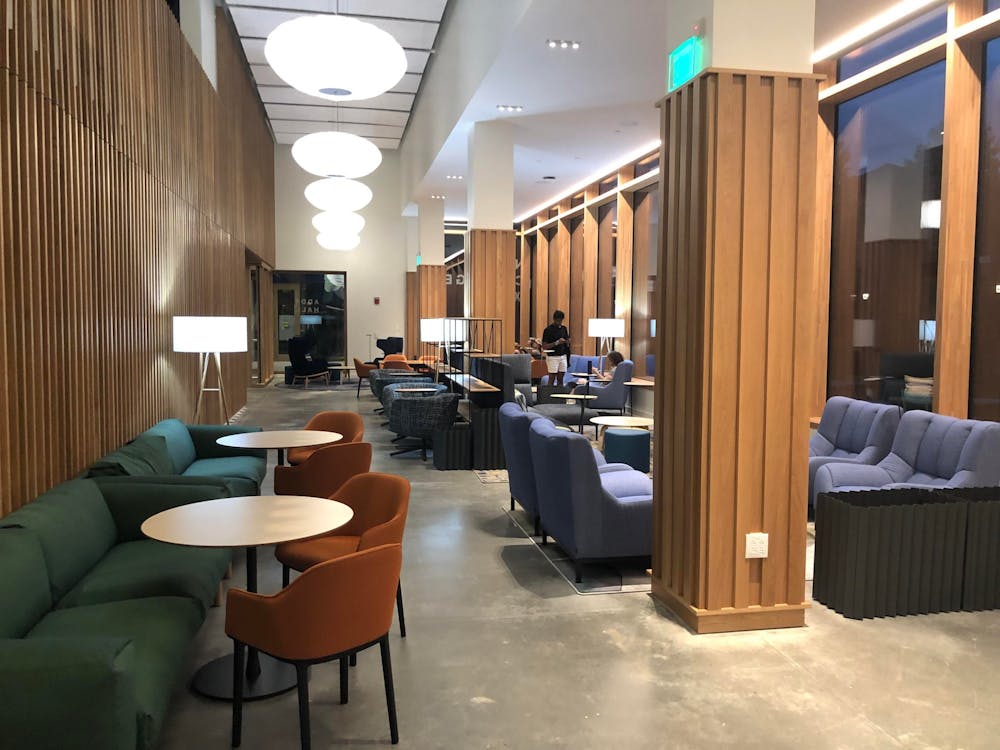Answering the phone at her Colorado home in the foothills of the Rocky Mountains, novelist Francine Mathews '85 seemed relaxed after feeding her two sons — ages six and two — and putting them to bed.
Admitting she felt a little tired after a long day, Mathews began to recollect her memories of Princeton.
"The year I edited the 'Prince,' I realized I was a writer — which I hadn't understood before," Mathews said. "Writing is the one thing that became this common thread for me in everything I've done."
Mathews happily recalled her writing style and editing skills were molded by her experience working with University professor John McPhee '53.
"It did have a profound impact on me in a number of ways. First, I suppose it's John's personality — as a personality he lingers in your mind for years afterwards," she said.
"In terms of what he taught me about writing, I think it's the editing that has lasted with me most strongly," Mathews continued. "I have an inherent laziness about my writing. I prefer to simply do a first draft and go with it. Every time we wrote for him he would sit down with us for about 45 minutes to an hour individually and go over the four pages we had written for him line by line, word by word. Then he would say, 'why did you choose this word,' 'could you have chosen other words?' I had never thought about my writing to that level of detail. But I do now."
Mathews may have enjoyed taking writing classes, but she majored in European history while at Princeton. Socially, the eating club life was not an important part of her experience."I didn't want to deal with Bicker or the whole selective process, so I just sort of enjoyed joining something that was low pressure," she said. "It was very isolating to be an independent. I tried it for six months and it was just deadly — it's almost a form of ostracism."
As a result, she joined Charter Club. "I loved the whole 'Street,' and I liked going to parties on weekends," Mathews said. "I just didn't like being stuck eating at them three times a day."

Life after Princeton, however, was very different. "I [went to Stanford graduate school] because I didn't know what I wanted to do," she said.
It was at Stanford that she met her husband, Mark. They decided to move back to Washington, D.C. — where Mathews grew up — and she began a job search.
"I started doing this thing that people do in Washington," she said. "You start opening people's rolodexes that you know and they give you five names and they open their rolodexes and they give you five names. Eventually you get to this point where you are several generations removed from anybody you actually know."

After explaining her background to strangers on the phone, she began to hear the same response over and over again. "And they really all just kept saying the same thing, you really belong at the CIA," she said. "Which felt almost like someone saying to me, 'You really belong in prostitution.' It was bizarre."
Mathews applied for a job with the CIA and was hired as an analyst. Working for the agency from 1989 to 1993, she was assigned to Eastern European analysis where she prepared psychological profiles of leaders.
The job at the CIA continued a tradition of writing that for Mathews began with stints at The Miami Herald and San Jose Mercury News after college.
"By the time I was 29, I realized I wanted to be writing fiction and that working in journalism or analysis at the CIA were both ways to avoid the risk of working in fiction," she noted.
In 1993, Mathews took the risk and started writing her first book at night after work. At first, Mathews stayed away from writing stories about intelligence work because of CIA secrecy agreements.The transition to spy novels, however, was not as smooth as Mathews had hoped.
"This is my tenth novel and it's the first about espionage. That's because I have to submit espionage-related fiction to the agency for review," Mathews said. "I really avoided that process because I didn't want to be censored and that's what it felt like to me."
But the CIA was not critical at all about her novel, The Cutout.
"Actually they were phenomenal. They turned it around in ten days and they only asked me to change one word," she said. "It was a shock. I thought I'd get half my text back."
Writing almost constantly, Mathews is contracted out for several years and is writing two novels a year. Conducting research for her novels, she said, has been a fulfilling educational experience.
"I think what's been useful for me, and probably what I derive most from Princeton in particular, is that my books are really vehicles for doing research into things I'm interested in," she said. "A lot of people say write what you know, but I have found that you write what interests you and educate yourself about it. That's the fun part for me.
"What I loved about my time at Princeton was the time I spent with extraordinary teachers and that's what has lived in my mind. That's what you carry with you 15 years out — the memory of people who could convey their subject matter so vividly that you felt you had lived it too," she said.







